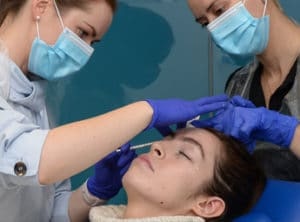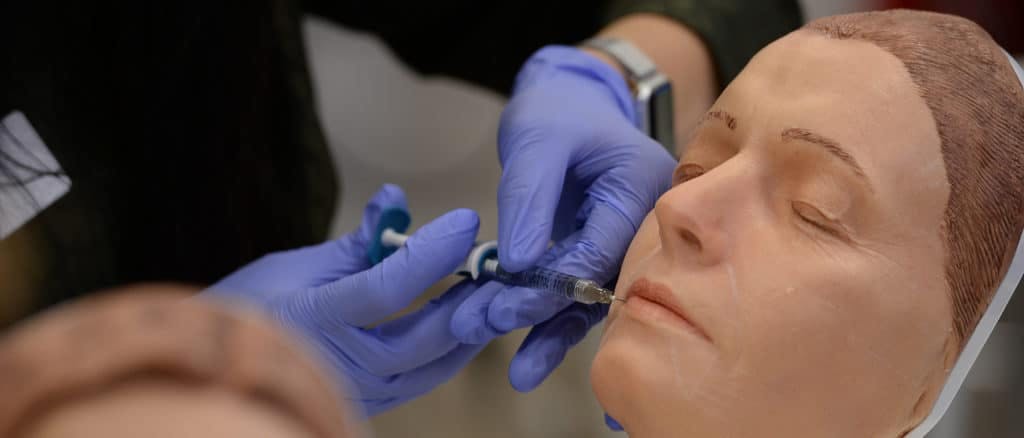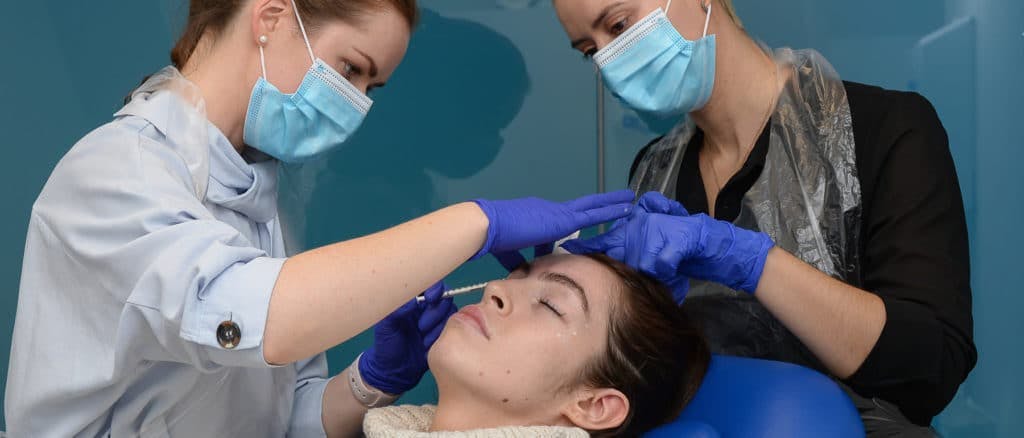UK Campaign For Mandatory Advanced Aesthetics Training

On 19 March 2021 the Joint Council for Cosmetic Practitioners (JCCP) released its 10 Point Plan for Aesthetics Regulation. Whilst this covered various aspects of the aesthetic medicine industry, it will come as no surprise that we wish to focus on its campaign for mandatory advanced aesthetics training.
Harley Academy is built upon the premise that every aesthetics practitioner should be safe, ethical, well-qualified and properly licensed. We strongly believe in the need for the UK aesthetics industry to be better regulated to ensure patient safety.

“Essentially, this new plan from the JCCP explains how it is working hard to establish mandatory advanced aesthetics training across the UK for all aesthetic medicine practitioners, along with nationally-recognised statutory standards and CPD criteria for these training courses,” advises Harley Academy CEO and founder, Dr Tristan Mehta (pictured).
He further explains, “Anyone seeking aesthetics training should be confident they are receiving the best possible education that will teach them how to become a safe and competent injector. Once they have qualified, they should join a recognised national register where patients can find reliable practitioners.
Training establishments must be run in an ethical way and any found to be making misleading or inappropriate claims in the advertising of their services, particularly on social media, should be held accountable. Fines may be imposed for those found in breach.
Local authorities should have the power to issue on-the-spot penalties to inadequate practitioners or where premises do not meet the necessary standards of public safety.
Government and a dedicated industry task force should raise awareness of the lack of regulation in aesthetics training so the public understands how to obtain ethical treatment.
We applaud their efforts and are proud to partner with the JCCP in providing, through our industry-leading Level 7 Diploma in Botox and Dermal Fillers, the highest standard of injectables training in the UK.”
Read on for a more in-depth review of this announcement as it pertains to education and training in the UK aesthetics sector…
Mandatory aesthetics training and education standards

The JCCP circulated a more detailed report in support of its 10 Point Plan. This clearly sets out its aim to have UK government regulators, alongside education and/or training regulators, mandate “specific qualifications, education and training requirements for specific modalities”.
Various issues were outlined in relation to the state – and lack – of compulsory aesthetics training courses at present. These can be summarised, as below.
– There are currently no legal requirements for aesthetics practitioners to undergo any regulated training or demonstrate any competence as an injector before they can start treating patients. This has huge implications for public protection and patient safety.
– The area of requisite aesthetic medicine training is considered confusing and clarity is required both by those within the industry and patients seeking aesthetics treatments.
– Whilst the JCCP and the Cosmetic Practice Standards Authority (CPSA) created UK guidelines for practice and competency standards in aesthetic medicine in 2020, these are not legally enforceable. This further adds to public safety concerns.
– As there is no government-mandated aesthetics training, the Office of Qualifications and Examinations Regulation (Ofqual) reportedly advised the JCCP it has no authority to appoint an Awarding Body to regulate or verify aesthetics qualifications. The JCCP has stated that it “considers the current Ofqual position to be a matter of concern since failure to require Awarding Bodies to confirm that their regulated qualifications conform to an industry standard leaves too much interpretation within the context of a highly commercial, disparate and fragmented sector and has led to the creation of substandard curricula and assessment strategies that present potential risk to public protection and patient safety”.
– Rightly, the JCCP is concerned that, in addition to there being no national aesthetics education mandate, there are also no formal qualification, registration or quality requirements for aesthetic medicine training course providers in the UK. This includes a lack of official CPD framework which has caused individuals to make “exaggerated claims” relating to their competency and skill levels to insurance companies.
– Misleading and unethical information is widespread in the advertising for the UK aesthetics training sector, as per evidence collated by the JCCP. It advises that this has “led many practitioners to believe incorrectly that they are receiving ‘accredited’ training (often at very high personal cost)”. The JCCP continues to work with the Advertising Standards Agency (ASA) on this but the problem is extensive. The bodies believe “Better information for the public and practitioners is required to inform them of what to look for with regard to appropriate qualifications, and greater powers are needed to prevent misleading and unethical/exaggerated advertising of education and training courses”.
– Social media is a key battleground in the fight against inappropriate, unethical and misleading claims related to aesthetic medicine training courses. Both the ASA and Committee for Advertising Practice (CAP) remain dedicated to challenging training providers making false claims or exaggerated assertions online. These adverts for “unsafe” courses are considered rife.
JCCP objectives and proposals for UK aesthetics training

As part of its remit to ensure proper regulation of and compliance for the UK aesthetics training sector, the JCCP plans to continue leveraging its network to lobby for positive, legislative change. The relevant objectives and aims are precised below.
– Developing and implementing primary and secondary legislation for agreed standards in aesthetics education and training in non-surgical cosmetic treatments, which can be legally enforced. This will be a joint initiative with the UK Government and devolved National Parliaments/Assemblies.
– Local Authority Enforcement Officers should be granted relevant powers to enforce statutory aesthetics training standards and take immediate action where standards are not met. This should apply to both practitioners and premises.
– By working with the Department of Health and Social Care (DHSC) and the Department for Education (DofE), the JCCP hopes to bring in “additional quality assurance checks to ensure that regulated qualifications in non-surgical cosmetics meet all relevant industry standards to confirm occupational competence, patient safety and public protection”. It is hoped this may convince Ofqual to reconsider its current stance.
– Ongoing work with the ASA, social media platforms and agencies to stem the flow of misinformation online with regards to aesthetic medicine training courses and their “exaggerated or inaccurate advertising” on social media. The JCCP would like to see thorough investigations, with “proportionate sanctions” applied to offending advertisers.
– Continuing ASA/CAP/JCCP initiative to encourage insurers, CPD agencies and aesthetics training companies to operate ethically, ensuring a high standard of education that produces competent and safe injectors. Failure to do so should incur sanctions including financial penalties.
– All individual aesthetics practitioners to be encouraged to register with a recognised professional standards association. They should also be able to demonstrate their competency and knowledge of specific treatments backed by a regulated qualification at the appropriate level.
– The JCCP will continue to “update and revise the JCCP Education and Training Competency Framework and CPSA Standards (2018) plus the option for statutory enforcement of the same”. It will also “work with Ofqual/SQA approved Awarding Organisations to develop and submit qualifications for regulatory approval by Ofqual”.
– By working closely with “national membership groups, expert reference groups and ‘key influencers’” alongside “designated politicians (and the All Party Parliamentary Group on Beauty, Wellbeing and Aesthetics) who have declared an interest in sponsoring this agenda” the JCCP hopes to generate a national awareness campaign and parliamentary debate.
We will continue to report on the JCCP’s progress as further information becomes available.
All information correct at the time of publication.
Download our full prospectus
Browse all our injectables, dermal fillers and cosmetic dermatology courses in one document
By submitting this form, you agree to receive marketing about our products, events, promotions and exclusive content. Consent is not a condition of purchase, and no purchase is necessary. Message frequency varies. View our Privacy Policy and Terms & Conditions
Attend our FREE open evening
If you're not sure which course is right for you, let us help
Join us online or in-person at our free open evening to learn more
Our Partners













STAY INFORMED
Sign up to receive industry news, careers advice, special offers and information on Harley Academy courses and services

